Organizational Behavior Analysis: Regency Grand Hotel Case Study
VerifiedAdded on 2022/11/24
|6
|1627
|311
Case Study
AI Summary
This assignment analyzes the Regency Grand Hotel case study, focusing on the impact of a new General Manager's leadership style on the hotel's performance and employee morale. The analysis identifies symptoms and problems arising from the implementation of empowerment practices, such as employee confusion, increased customer complaints, and demotivation. It applies organizational behavior theories, including Human Relation Behavioural Theory, Decision-Making Behavioural Theory, Servant Leadership Behavioural Theory, and Motivational Theory, to explain the challenges faced. The assignment recommends a course of action for the General Manager, emphasizing the importance of guiding employees, providing appreciation, and fostering a supportive environment. The document concludes by highlighting the significance of organizational behavior in maintaining human relations and achieving organizational objectives. It stresses the importance of leadership in employee satisfaction and overall business success, offering insights applicable to any workplace.
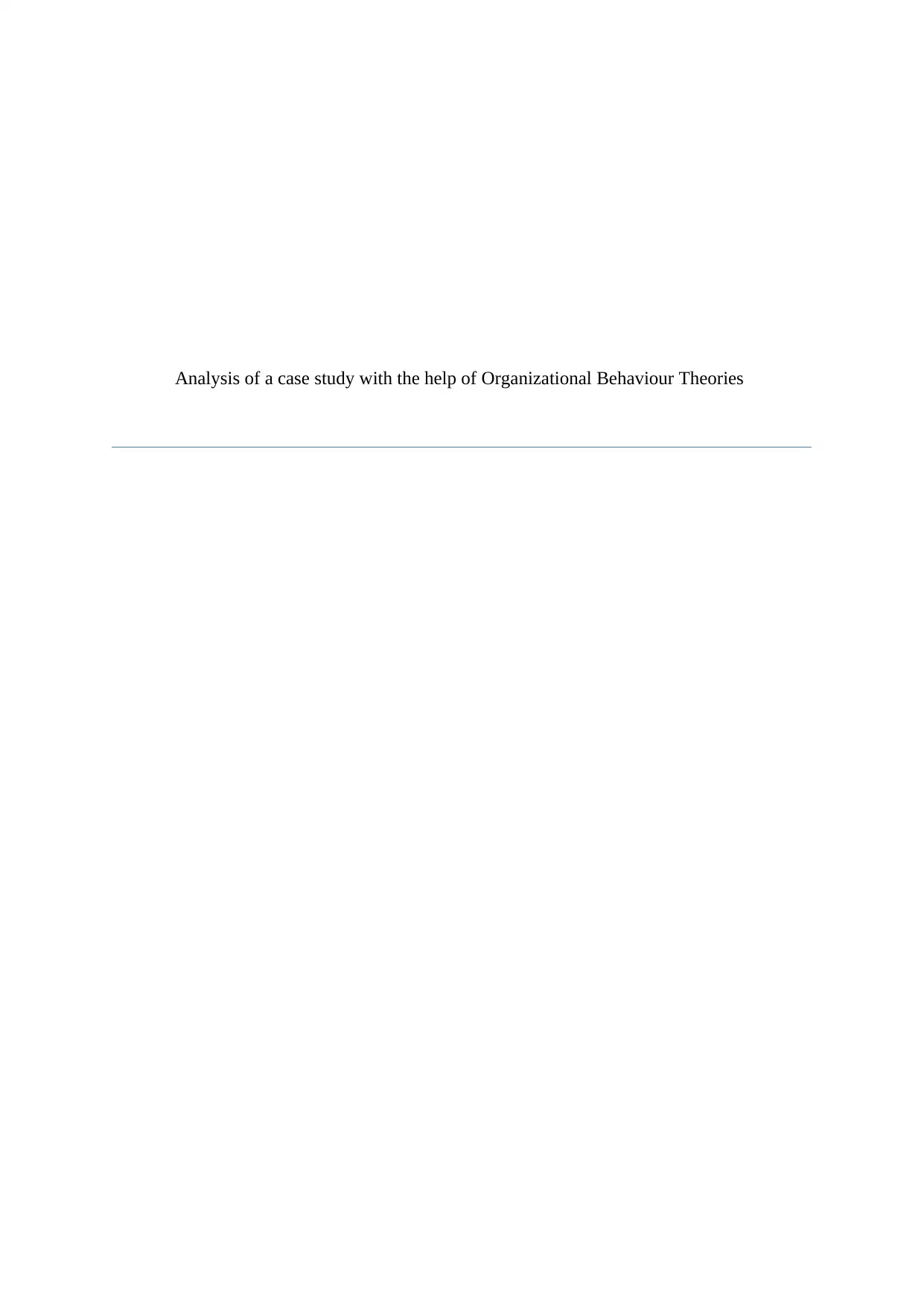
Analysis of a case study with the help of Organizational Behaviour Theories
Paraphrase This Document
Need a fresh take? Get an instant paraphrase of this document with our AI Paraphraser
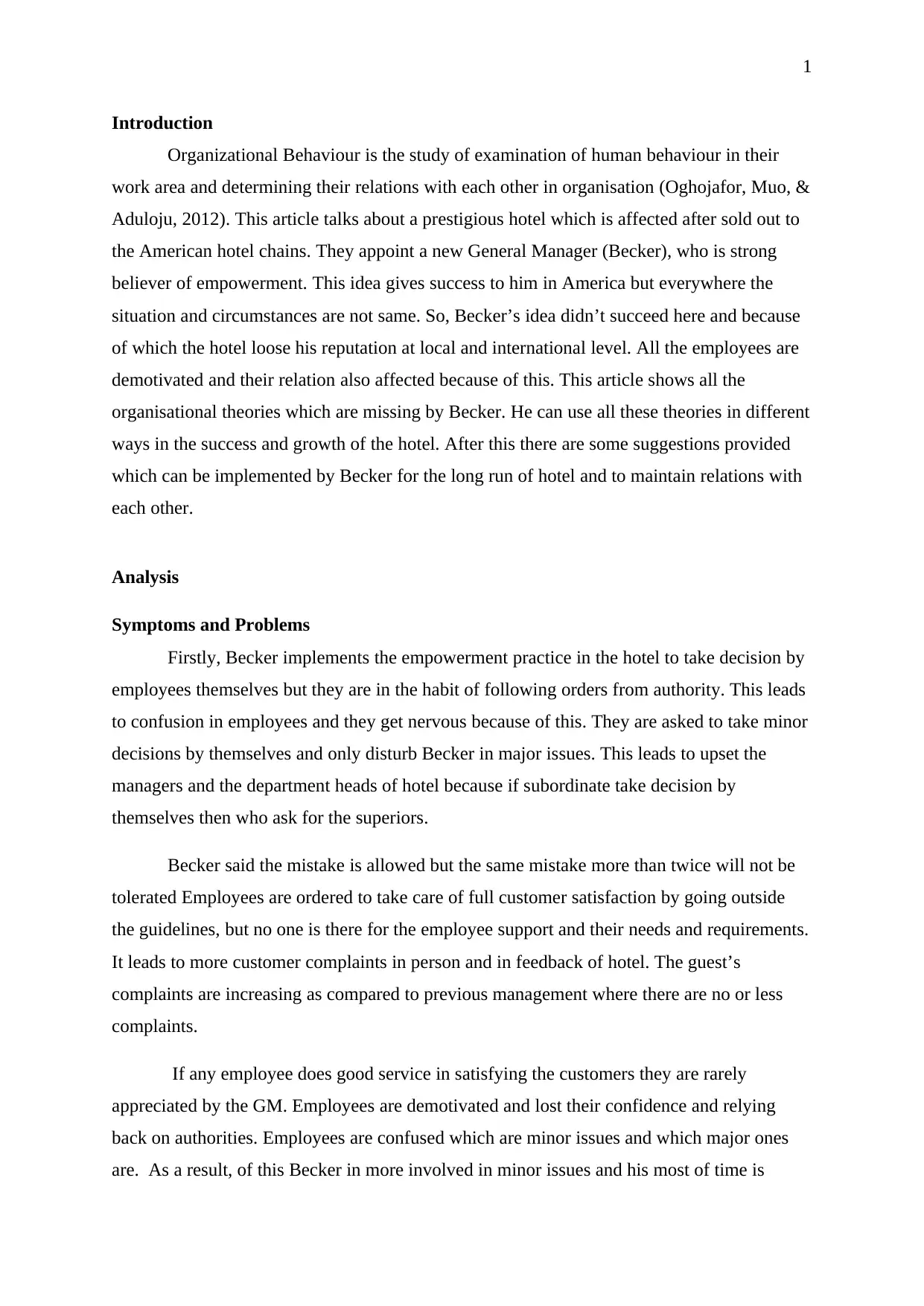
1
Introduction
Organizational Behaviour is the study of examination of human behaviour in their
work area and determining their relations with each other in organisation (Oghojafor, Muo, &
Aduloju, 2012). This article talks about a prestigious hotel which is affected after sold out to
the American hotel chains. They appoint a new General Manager (Becker), who is strong
believer of empowerment. This idea gives success to him in America but everywhere the
situation and circumstances are not same. So, Becker’s idea didn’t succeed here and because
of which the hotel loose his reputation at local and international level. All the employees are
demotivated and their relation also affected because of this. This article shows all the
organisational theories which are missing by Becker. He can use all these theories in different
ways in the success and growth of the hotel. After this there are some suggestions provided
which can be implemented by Becker for the long run of hotel and to maintain relations with
each other.
Analysis
Symptoms and Problems
Firstly, Becker implements the empowerment practice in the hotel to take decision by
employees themselves but they are in the habit of following orders from authority. This leads
to confusion in employees and they get nervous because of this. They are asked to take minor
decisions by themselves and only disturb Becker in major issues. This leads to upset the
managers and the department heads of hotel because if subordinate take decision by
themselves then who ask for the superiors.
Becker said the mistake is allowed but the same mistake more than twice will not be
tolerated Employees are ordered to take care of full customer satisfaction by going outside
the guidelines, but no one is there for the employee support and their needs and requirements.
It leads to more customer complaints in person and in feedback of hotel. The guest’s
complaints are increasing as compared to previous management where there are no or less
complaints.
If any employee does good service in satisfying the customers they are rarely
appreciated by the GM. Employees are demotivated and lost their confidence and relying
back on authorities. Employees are confused which are minor issues and which major ones
are. As a result, of this Becker in more involved in minor issues and his most of time is
Introduction
Organizational Behaviour is the study of examination of human behaviour in their
work area and determining their relations with each other in organisation (Oghojafor, Muo, &
Aduloju, 2012). This article talks about a prestigious hotel which is affected after sold out to
the American hotel chains. They appoint a new General Manager (Becker), who is strong
believer of empowerment. This idea gives success to him in America but everywhere the
situation and circumstances are not same. So, Becker’s idea didn’t succeed here and because
of which the hotel loose his reputation at local and international level. All the employees are
demotivated and their relation also affected because of this. This article shows all the
organisational theories which are missing by Becker. He can use all these theories in different
ways in the success and growth of the hotel. After this there are some suggestions provided
which can be implemented by Becker for the long run of hotel and to maintain relations with
each other.
Analysis
Symptoms and Problems
Firstly, Becker implements the empowerment practice in the hotel to take decision by
employees themselves but they are in the habit of following orders from authority. This leads
to confusion in employees and they get nervous because of this. They are asked to take minor
decisions by themselves and only disturb Becker in major issues. This leads to upset the
managers and the department heads of hotel because if subordinate take decision by
themselves then who ask for the superiors.
Becker said the mistake is allowed but the same mistake more than twice will not be
tolerated Employees are ordered to take care of full customer satisfaction by going outside
the guidelines, but no one is there for the employee support and their needs and requirements.
It leads to more customer complaints in person and in feedback of hotel. The guest’s
complaints are increasing as compared to previous management where there are no or less
complaints.
If any employee does good service in satisfying the customers they are rarely
appreciated by the GM. Employees are demotivated and lost their confidence and relying
back on authorities. Employees are confused which are minor issues and which major ones
are. As a result, of this Becker in more involved in minor issues and his most of time is
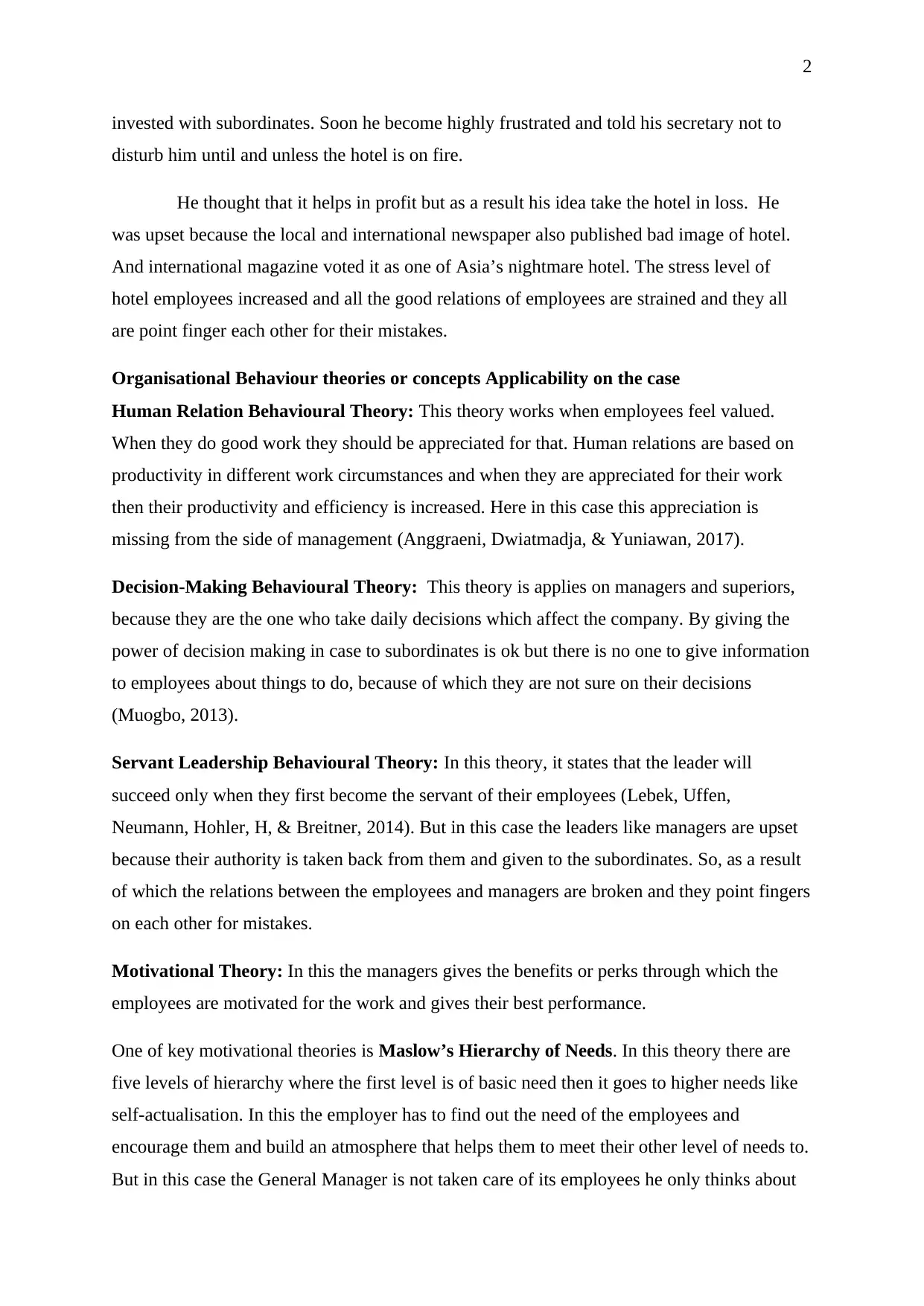
2
invested with subordinates. Soon he become highly frustrated and told his secretary not to
disturb him until and unless the hotel is on fire.
He thought that it helps in profit but as a result his idea take the hotel in loss. He
was upset because the local and international newspaper also published bad image of hotel.
And international magazine voted it as one of Asia’s nightmare hotel. The stress level of
hotel employees increased and all the good relations of employees are strained and they all
are point finger each other for their mistakes.
Organisational Behaviour theories or concepts Applicability on the case
Human Relation Behavioural Theory: This theory works when employees feel valued.
When they do good work they should be appreciated for that. Human relations are based on
productivity in different work circumstances and when they are appreciated for their work
then their productivity and efficiency is increased. Here in this case this appreciation is
missing from the side of management (Anggraeni, Dwiatmadja, & Yuniawan, 2017).
Decision-Making Behavioural Theory: This theory is applies on managers and superiors,
because they are the one who take daily decisions which affect the company. By giving the
power of decision making in case to subordinates is ok but there is no one to give information
to employees about things to do, because of which they are not sure on their decisions
(Muogbo, 2013).
Servant Leadership Behavioural Theory: In this theory, it states that the leader will
succeed only when they first become the servant of their employees (Lebek, Uffen,
Neumann, Hohler, H, & Breitner, 2014). But in this case the leaders like managers are upset
because their authority is taken back from them and given to the subordinates. So, as a result
of which the relations between the employees and managers are broken and they point fingers
on each other for mistakes.
Motivational Theory: In this the managers gives the benefits or perks through which the
employees are motivated for the work and gives their best performance.
One of key motivational theories is Maslow’s Hierarchy of Needs. In this theory there are
five levels of hierarchy where the first level is of basic need then it goes to higher needs like
self-actualisation. In this the employer has to find out the need of the employees and
encourage them and build an atmosphere that helps them to meet their other level of needs to.
But in this case the General Manager is not taken care of its employees he only thinks about
invested with subordinates. Soon he become highly frustrated and told his secretary not to
disturb him until and unless the hotel is on fire.
He thought that it helps in profit but as a result his idea take the hotel in loss. He
was upset because the local and international newspaper also published bad image of hotel.
And international magazine voted it as one of Asia’s nightmare hotel. The stress level of
hotel employees increased and all the good relations of employees are strained and they all
are point finger each other for their mistakes.
Organisational Behaviour theories or concepts Applicability on the case
Human Relation Behavioural Theory: This theory works when employees feel valued.
When they do good work they should be appreciated for that. Human relations are based on
productivity in different work circumstances and when they are appreciated for their work
then their productivity and efficiency is increased. Here in this case this appreciation is
missing from the side of management (Anggraeni, Dwiatmadja, & Yuniawan, 2017).
Decision-Making Behavioural Theory: This theory is applies on managers and superiors,
because they are the one who take daily decisions which affect the company. By giving the
power of decision making in case to subordinates is ok but there is no one to give information
to employees about things to do, because of which they are not sure on their decisions
(Muogbo, 2013).
Servant Leadership Behavioural Theory: In this theory, it states that the leader will
succeed only when they first become the servant of their employees (Lebek, Uffen,
Neumann, Hohler, H, & Breitner, 2014). But in this case the leaders like managers are upset
because their authority is taken back from them and given to the subordinates. So, as a result
of which the relations between the employees and managers are broken and they point fingers
on each other for mistakes.
Motivational Theory: In this the managers gives the benefits or perks through which the
employees are motivated for the work and gives their best performance.
One of key motivational theories is Maslow’s Hierarchy of Needs. In this theory there are
five levels of hierarchy where the first level is of basic need then it goes to higher needs like
self-actualisation. In this the employer has to find out the need of the employees and
encourage them and build an atmosphere that helps them to meet their other level of needs to.
But in this case the General Manager is not taken care of its employees he only thinks about
⊘ This is a preview!⊘
Do you want full access?
Subscribe today to unlock all pages.

Trusted by 1+ million students worldwide
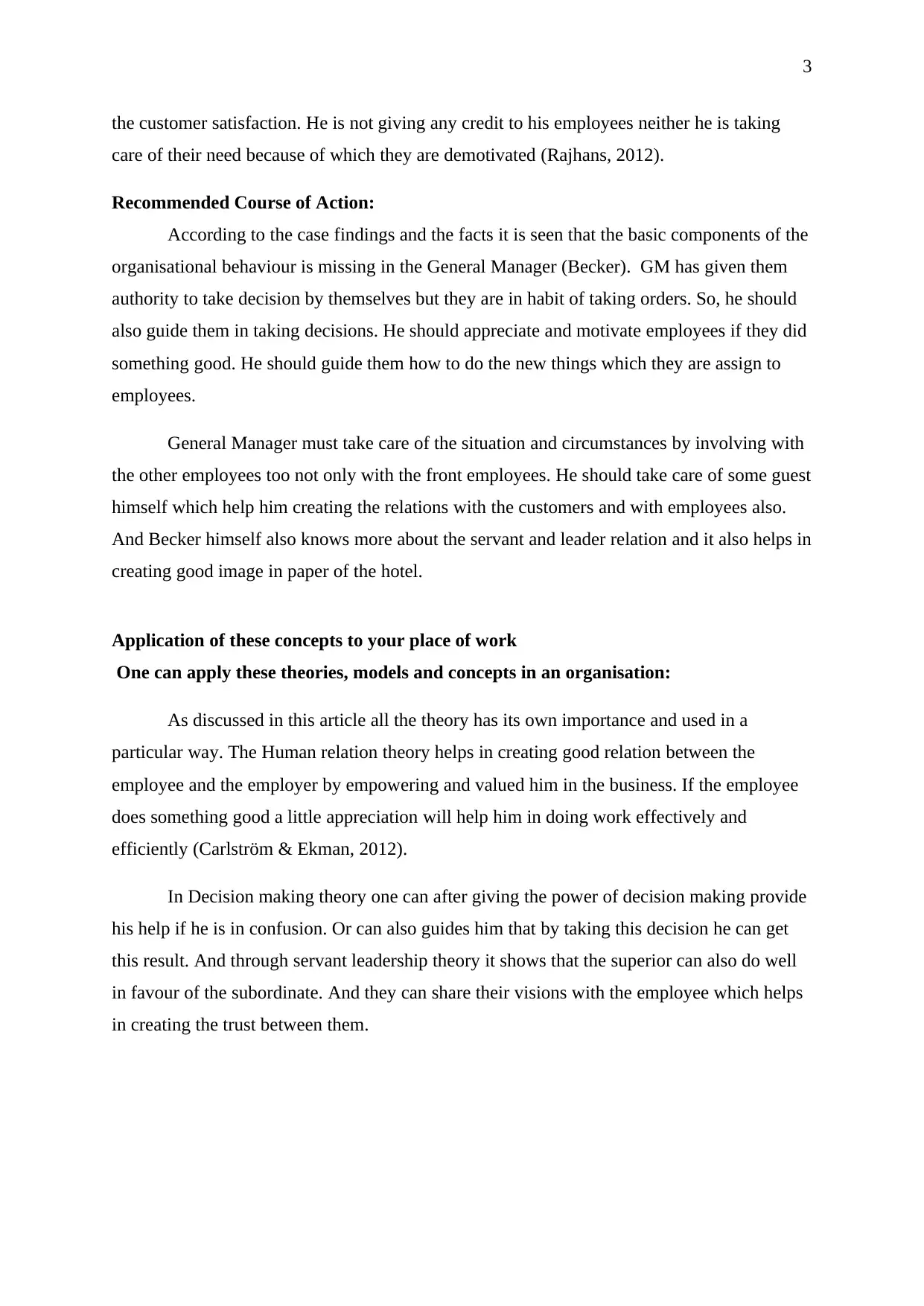
3
the customer satisfaction. He is not giving any credit to his employees neither he is taking
care of their need because of which they are demotivated (Rajhans, 2012).
Recommended Course of Action:
According to the case findings and the facts it is seen that the basic components of the
organisational behaviour is missing in the General Manager (Becker). GM has given them
authority to take decision by themselves but they are in habit of taking orders. So, he should
also guide them in taking decisions. He should appreciate and motivate employees if they did
something good. He should guide them how to do the new things which they are assign to
employees.
General Manager must take care of the situation and circumstances by involving with
the other employees too not only with the front employees. He should take care of some guest
himself which help him creating the relations with the customers and with employees also.
And Becker himself also knows more about the servant and leader relation and it also helps in
creating good image in paper of the hotel.
Application of these concepts to your place of work
One can apply these theories, models and concepts in an organisation:
As discussed in this article all the theory has its own importance and used in a
particular way. The Human relation theory helps in creating good relation between the
employee and the employer by empowering and valued him in the business. If the employee
does something good a little appreciation will help him in doing work effectively and
efficiently (Carlström & Ekman, 2012).
In Decision making theory one can after giving the power of decision making provide
his help if he is in confusion. Or can also guides him that by taking this decision he can get
this result. And through servant leadership theory it shows that the superior can also do well
in favour of the subordinate. And they can share their visions with the employee which helps
in creating the trust between them.
the customer satisfaction. He is not giving any credit to his employees neither he is taking
care of their need because of which they are demotivated (Rajhans, 2012).
Recommended Course of Action:
According to the case findings and the facts it is seen that the basic components of the
organisational behaviour is missing in the General Manager (Becker). GM has given them
authority to take decision by themselves but they are in habit of taking orders. So, he should
also guide them in taking decisions. He should appreciate and motivate employees if they did
something good. He should guide them how to do the new things which they are assign to
employees.
General Manager must take care of the situation and circumstances by involving with
the other employees too not only with the front employees. He should take care of some guest
himself which help him creating the relations with the customers and with employees also.
And Becker himself also knows more about the servant and leader relation and it also helps in
creating good image in paper of the hotel.
Application of these concepts to your place of work
One can apply these theories, models and concepts in an organisation:
As discussed in this article all the theory has its own importance and used in a
particular way. The Human relation theory helps in creating good relation between the
employee and the employer by empowering and valued him in the business. If the employee
does something good a little appreciation will help him in doing work effectively and
efficiently (Carlström & Ekman, 2012).
In Decision making theory one can after giving the power of decision making provide
his help if he is in confusion. Or can also guides him that by taking this decision he can get
this result. And through servant leadership theory it shows that the superior can also do well
in favour of the subordinate. And they can share their visions with the employee which helps
in creating the trust between them.
Paraphrase This Document
Need a fresh take? Get an instant paraphrase of this document with our AI Paraphraser
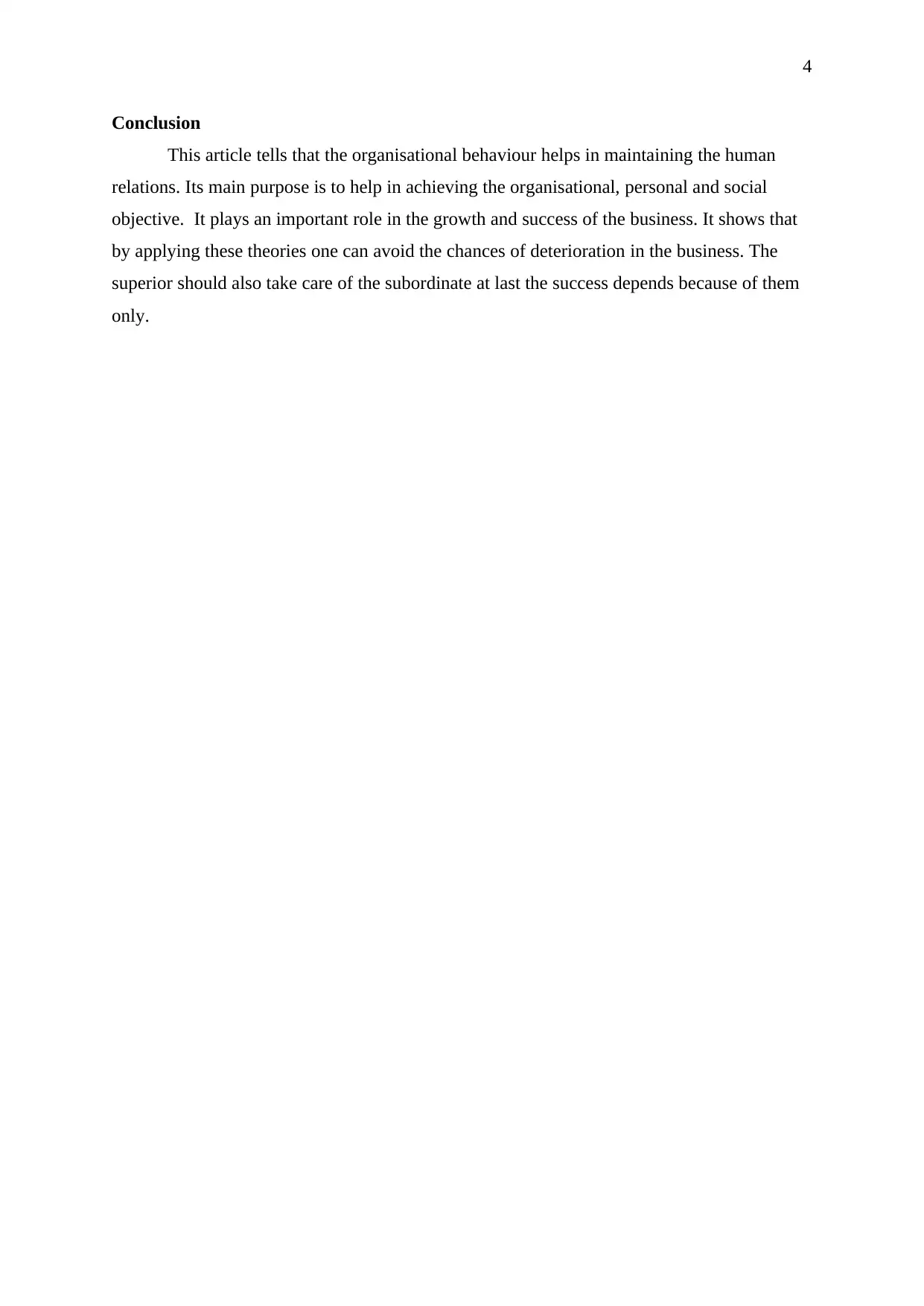
4
Conclusion
This article tells that the organisational behaviour helps in maintaining the human
relations. Its main purpose is to help in achieving the organisational, personal and social
objective. It plays an important role in the growth and success of the business. It shows that
by applying these theories one can avoid the chances of deterioration in the business. The
superior should also take care of the subordinate at last the success depends because of them
only.
Conclusion
This article tells that the organisational behaviour helps in maintaining the human
relations. Its main purpose is to help in achieving the organisational, personal and social
objective. It plays an important role in the growth and success of the business. It shows that
by applying these theories one can avoid the chances of deterioration in the business. The
superior should also take care of the subordinate at last the success depends because of them
only.
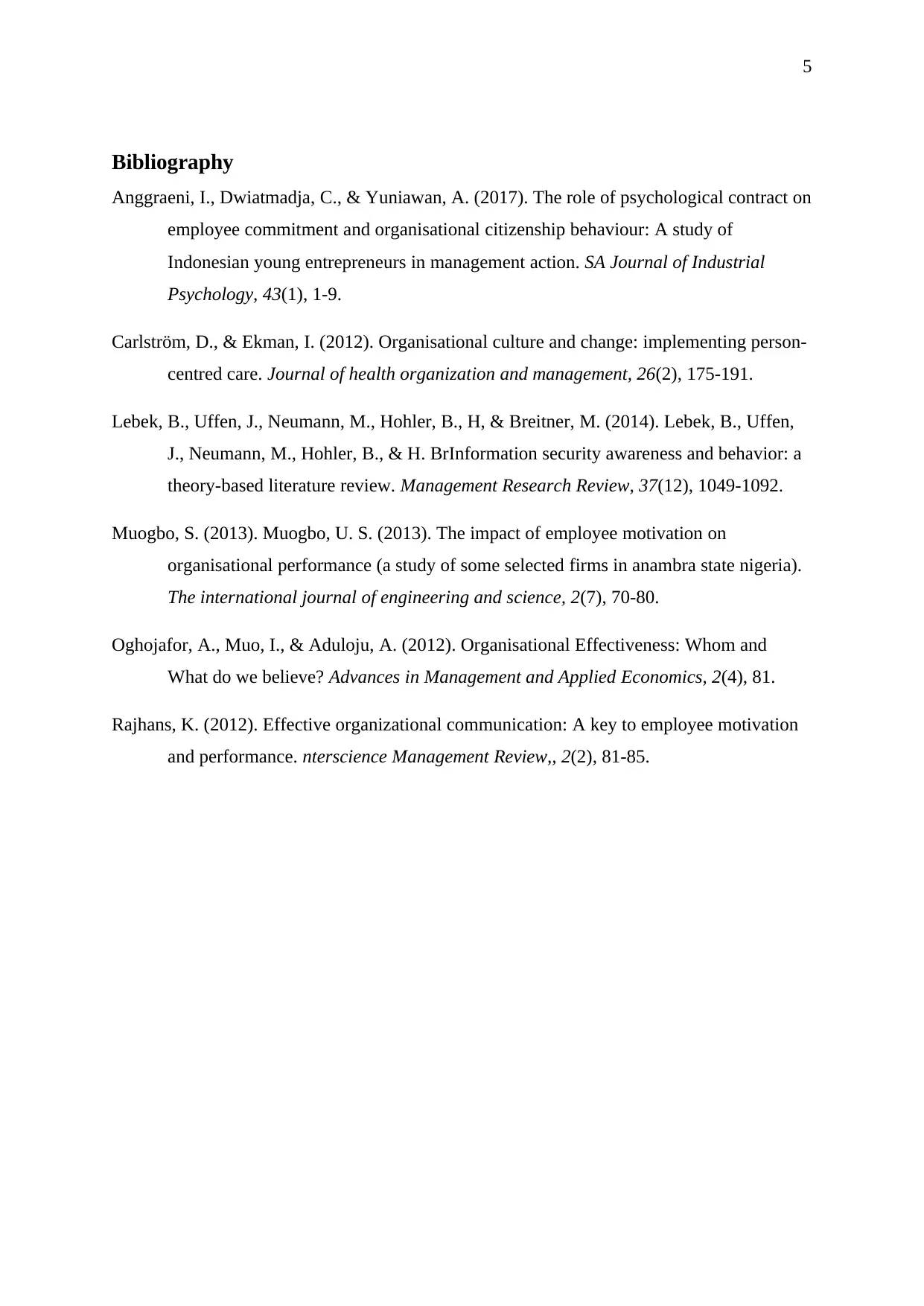
5
Bibliography
Anggraeni, I., Dwiatmadja, C., & Yuniawan, A. (2017). The role of psychological contract on
employee commitment and organisational citizenship behaviour: A study of
Indonesian young entrepreneurs in management action. SA Journal of Industrial
Psychology, 43(1), 1-9.
Carlström, D., & Ekman, I. (2012). Organisational culture and change: implementing person-
centred care. Journal of health organization and management, 26(2), 175-191.
Lebek, B., Uffen, J., Neumann, M., Hohler, B., H, & Breitner, M. (2014). Lebek, B., Uffen,
J., Neumann, M., Hohler, B., & H. BrInformation security awareness and behavior: a
theory-based literature review. Management Research Review, 37(12), 1049-1092.
Muogbo, S. (2013). Muogbo, U. S. (2013). The impact of employee motivation on
organisational performance (a study of some selected firms in anambra state nigeria).
The international journal of engineering and science, 2(7), 70-80.
Oghojafor, A., Muo, I., & Aduloju, A. (2012). Organisational Effectiveness: Whom and
What do we believe? Advances in Management and Applied Economics, 2(4), 81.
Rajhans, K. (2012). Effective organizational communication: A key to employee motivation
and performance. nterscience Management Review,, 2(2), 81-85.
Bibliography
Anggraeni, I., Dwiatmadja, C., & Yuniawan, A. (2017). The role of psychological contract on
employee commitment and organisational citizenship behaviour: A study of
Indonesian young entrepreneurs in management action. SA Journal of Industrial
Psychology, 43(1), 1-9.
Carlström, D., & Ekman, I. (2012). Organisational culture and change: implementing person-
centred care. Journal of health organization and management, 26(2), 175-191.
Lebek, B., Uffen, J., Neumann, M., Hohler, B., H, & Breitner, M. (2014). Lebek, B., Uffen,
J., Neumann, M., Hohler, B., & H. BrInformation security awareness and behavior: a
theory-based literature review. Management Research Review, 37(12), 1049-1092.
Muogbo, S. (2013). Muogbo, U. S. (2013). The impact of employee motivation on
organisational performance (a study of some selected firms in anambra state nigeria).
The international journal of engineering and science, 2(7), 70-80.
Oghojafor, A., Muo, I., & Aduloju, A. (2012). Organisational Effectiveness: Whom and
What do we believe? Advances in Management and Applied Economics, 2(4), 81.
Rajhans, K. (2012). Effective organizational communication: A key to employee motivation
and performance. nterscience Management Review,, 2(2), 81-85.
⊘ This is a preview!⊘
Do you want full access?
Subscribe today to unlock all pages.

Trusted by 1+ million students worldwide
1 out of 6
Related Documents
Your All-in-One AI-Powered Toolkit for Academic Success.
+13062052269
info@desklib.com
Available 24*7 on WhatsApp / Email
![[object Object]](/_next/static/media/star-bottom.7253800d.svg)
Unlock your academic potential
Copyright © 2020–2026 A2Z Services. All Rights Reserved. Developed and managed by ZUCOL.




